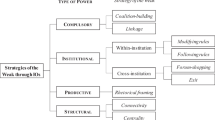Abstract
This symposium presents a rich set of concepts, data, and testing of relationships regarding the apparent explosion of informal governance activities in world politics. The authors theorize and describe a wide variety of modes of informal governance. I summarize key contributions of this literature and suggest new paths for further research.
Similar content being viewed by others
Notes
According to the dimensions above, the GATT was: transparent, binding, state-centric, and had moderately formal decision-making procedures, hierarchy, and institutional structure. Thus it was not a TGI (non-state actors were excluded) and did not fit any of the other ideal types of informality considered in this symposium. Yet it arguably is one of the most consequential “informal” international agreements of the twentieth century.
References
Abbott, K. W., & Snidal, D. (1998). Why states act through formal international organizations. Journal of Conflict Resolution, 42, 3–32.
Abbott, K. W., Greene, J. F., & Keohane, R. O. (2016). Organizational ecology and institutional change in global governance. International Organization, 70, 247–277.
Andonova, L. B. (2017). Governance entrepreneurs: International organizations and the rise of public-private partnerships. Cambridge: Cambridge University Press.
Avant, D., & Westerwinter, O. (2016). Introduction: Networks and transnational security governance. In D. Avant & O. Westerwinter (Eds.), The new power politics: Networks and transnational security governance (pp. 1–18). Oxford: Oxford University Press.
Carlson, Melissa and Barbara Koremenos. (Forthcoming). Cooperation Failure or Secret Collusion? Absolute Monarchs and Informal Cooperation. Review of International Organizations.
Hekman, S. J. (1983). Weber’s ideal type: A contemporary reassessment. Polity, 16, 119–137.
Keohane, R. O., & Nye, J. S. (1977). Power and interdependence: World politics in transition. Boston: Little, Brown and Company.
Kersting, E. and Kilby, C. (Forthcoming). Do Domestic Politics Shape U.S. Informal Influence in the World Bank? Review of International Organizations.
Kilby, C. (2013). An empirical assessment of informal influence in the World Bank. Economic Development and Cultural Change, 61, 431–464.
Kleine, M. (2013). Informal governance in the European Union: How governments make international organizations work. Ithaca: Cornell University Press.
Koremenos, B., Lipson, C., & Snidal, D. (2001). The rational Design of International Institutions. International Organization, 55, 761–799.
Krasner, S. D. (Ed.). (1983). International Regimes. Ithaca: Cornell University Press.
Lake, D. A., & Powell, R. (Eds.). (1999). Strategic choice and international relations. Princeton: Princeton University Press.
Powell, E. J. (2015). Islamic law states and peaceful resolution of territorial disputes. International Organization, 69, 777–807.
Reinsberg, B. and Westerwinter, O. (Forthcoming). The Global Governance of International Development: Documenting the Rise of Multi-Stakeholder Partnerships and Identifying Underlying Theoretical Explanations. Review of International Organizations.
Stone, R. W. (2011). Controlling institutions: International organizations and the global economy. Cambridge: Cambridge University Press.
Vabulas, F., & Snidal, D. (2013). Organization without delegation: Informal intergovernmental organizations (IIGOs) and the Spectrum of intergovernmental arrangements. Review of International Organizations, 8, 193–220.
Vreeland, J. R., & Dreher, A. (2014). The political economy of the United Nations Security Council: Money and influence. Cambridge: Cambridge University Press.
Westerwinter, O. (Forthcoming). Transnational Public-Private Governance Initiatives and World Politics: Introducing a New Dataset. Review of International Organizations.
Westerwinter, O., Abbott, K.W., and Biersteker, T. (Forthcoming). Informal Governance in World Politics: Introduction. Review of International Organizations.
Author information
Authors and Affiliations
Corresponding author
Additional information
Publisher’s note
Springer Nature remains neutral with regard to jurisdictional claims in published maps and institutional affiliations.
Rights and permissions
About this article
Cite this article
Martin, L.L. Formality, typologies, and institutional design. Rev Int Organ 16, 175–182 (2021). https://doi.org/10.1007/s11558-019-09375-9
Published:
Issue Date:
DOI: https://doi.org/10.1007/s11558-019-09375-9




